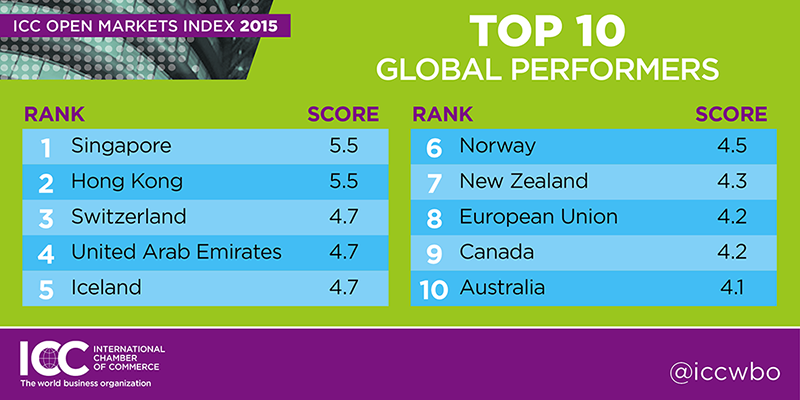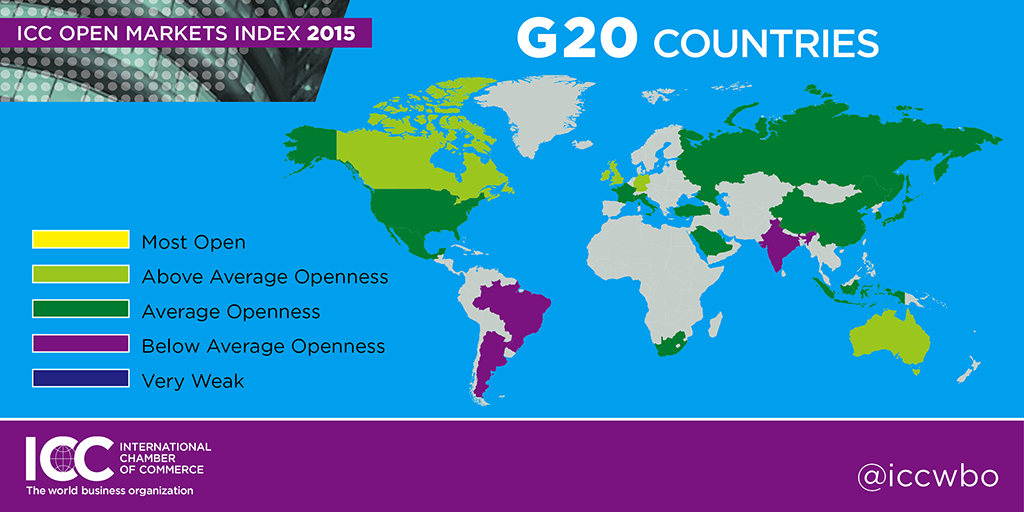
More effort required to open economies to global trade, according to ICC Open Markets Index
Despite repeated pledges to enable trade as a driver of growth and job creation, G20 economies are failing to demonstrate global leadership on trade openness according to the ICC Open Markets Index 2015 (OMI) published today.
• G7/G20 countries failing to demonstrate global leadership on trade
• Germany the only G20 country in top 20 open markets globally
• BRICS economies lagging, but show signs of opening
• Singapore and Hong Kong the world’s “most open” markets
• European Union more open to trade than the United States
The report – commissioned by the International Chamber of Commerce (ICC) – shows that G20 nations rank below the global standard in terms of openness to trade, with only Germany placing among the world’s top 20 open markets. Singapore and Hong Kong head the 2015 rankings for the third successive edition of the report, far outstripping major economies such as the United States in terms of trade openness.
The Index scores 75 countries on a scale of one to six on four key factors: observed trade openness, trade policy, openness to foreign direct investment and trade-enabling infrastructure. In doing so, the Index also monitors government follow through on longstanding G20 commitments to boost global trade flows, including pledges made at last year’s leaders’ Summit in Brisbane, Australia.
Scoring the G20 – room for improvement
The latest edition of the Index reveals that 16 of the G20 economies score onlyaverage or below average in terms of their overall openness to trade. The two lowest-scoring G20 economies are Brazil and India-though both economies have seen an increase in their score from last year.
Commenting on the launch of the report, ICC Secretary General John Danilovich said: “As world leaders look for new engines of growth in the current economic environment, the OMI data shows that there is still substantial scope for G20 leaders to take action to boost global trade. Rolling back protectionism and implementing reforms to facilitate trade flows should be cornerstones of a revitalized G20 agenda to promote renewed growth and stability in the global economy.”
Other findings
The latest edition of the Index, launched as business and government leaders gather in Ankara today at the Business-20 Summit, reveals that:
- the average score across the 75 countries ranked has increased incrementally from a score of 3.5 in 2011 to 3.6 in 2013 and to 3.7 in 2015.
- the European Union is outperforming the United States in terms of trade openness.
- only two economies ranked as ‘ excellent’ in terms of overall openness (scoring above 5.0), specifically Hong Kong and Singapore.
- the lowest ranking economies (scoring below 2.0), were Pakistan, Bangladesh, Ethiopia and Sudan.
- there is an upward trend in “trade policy” scores throughout the Index, but implementing the World Trade Organization’s Trade Facilitation Agreement (TFA) could provide a significant further boost.
We are calling on the G20 to commit to a package of reforms to enable trade as a driver of growth jobs and opportunity. That should start with a clear commitment to ratify and implement the WTO’s agreement on trade facilitation before the year is out
Commenting on the outlook for global trade, John Danilovich said: “In the past few weeks we have seen data suggesting that trade flows dropped in the second quarter of this year. This is a worrying trend and one that requires urgent international attention.”
Mr Danilovich added: “We are calling on the G20 to commit to a package of reforms to enable trade as a driver of growth jobs and opportunity. That should start with a clear commitment to ratify and implement the WTO’s agreement on trade facilitation before the year is out.”
According to an ICC commissioned study by the Peterson Institute-as part of ICC’s World Trade Agenda initiative-a simple package of trade reforms could generate export gains over the medium term in excess of US$2 trillion, creating some 34 million jobs in the process.
Click here for further details on the ICC Business World Trade Agenda



